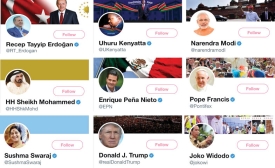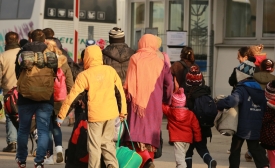social media
Vladimir Putin's regime is weaponizing the internet to sow chaos, confusion, and discord across the West.

Burson-Marsteller has released its second annual Twiplomacy study.
Between Twitter and FaceTime, Facebook and Vine, it’s easier than ever for world leaders to communicate virtually. But Marcus Holmes, assistant professor of government at William & Mary, believes that might not always be the best option. [...] As important as face-to-face diplomacy is, there’s growing evidence that also suggests politicians shouldn’t delete their Twitter accounts just yet. Holmes and his team in the Political Psychology and International Relations lab also research the usefulness of digital diplomacy[.]
International Medical Corps, established in 1984, and where I currently work, is a global, humanitarian, nonprofit organization dedicated to saving lives through health care training and relief. In order to spread awareness about the Syrian refugee crisis, International Medical Corps went one step further by using visual storytelling to provide a voice for refugees. “The Things We Carry” campaign, launched in March 2017 by International Medical Corps and the Conrad N. Hilton Foundation is an effort to keep public attention on the ongoing crisis in Syria.
Indonesia is promoting the annual Bali Arts Festival (PKB) by digitalizing its month-long activities and broadcasting live on particular website as well as in various social media channels. The breakthrough move came at the request of Indonesian President Joko Widodo, who wanted to make people across the world know more about the festival, a senior official overseeing the Bali provincial tourism said.

Laurence Desroches discusses a new digital storytelling campaign designed to bring attention to Syrian refugees.
Does life imitate art, or does it just seem that the longer the Trump adventure proceeds the more it resembles “House of Cards?” I’m not suggesting that our real-life drama borrows from the Netflix series, now seen round the world, but there is a sense in which the real and make-believe of American politics are converging as never before. Consider the debate over “real” news versus “fake news.” Consider that fact and non-reality are intertwined as never before in social media, IT games, and movies.







